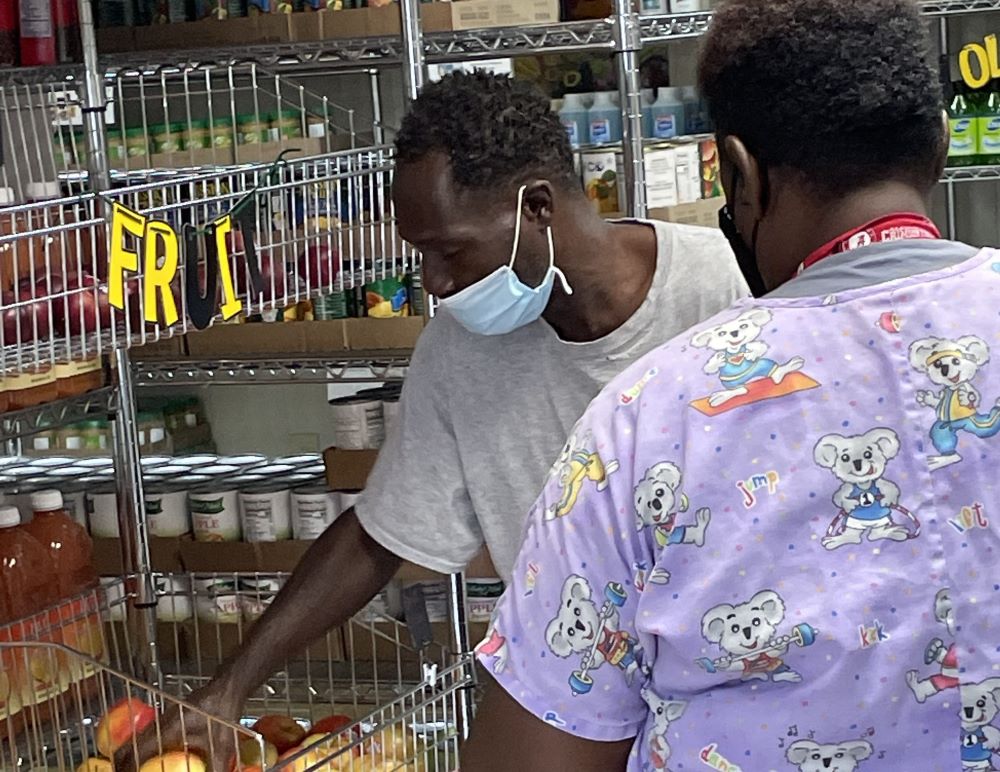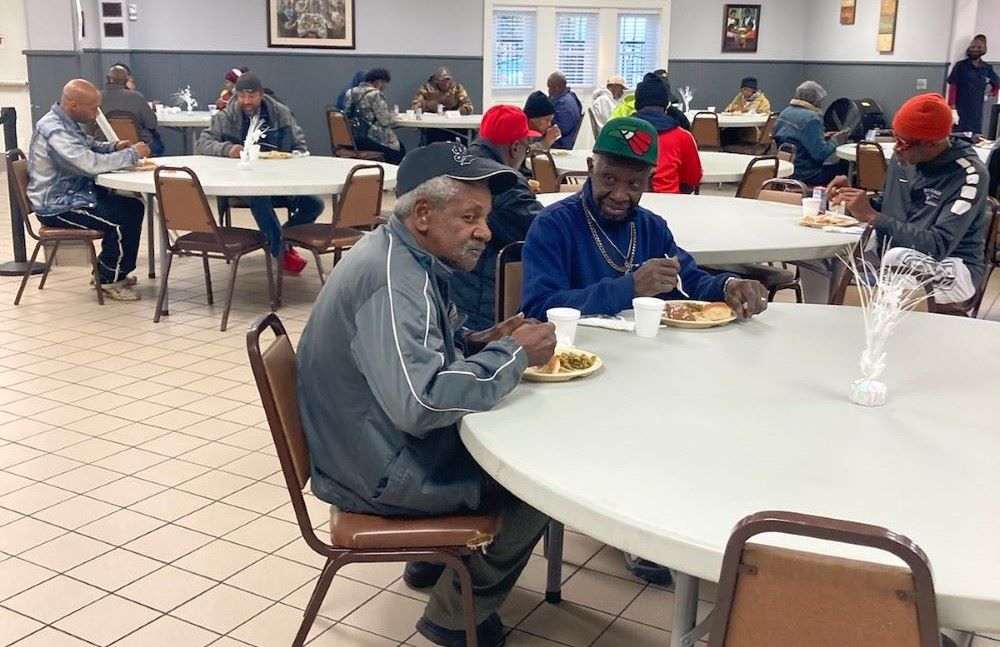Workers harvest collard greens on John Brown's farm in Dallas County, Alabama. Brown, who raises vegetables on the same land his father purchased about 80 years ago, is one of seven farmers in the Black Farmers Initiative, formed by the Edmundite Missions in partnership with the Deep South Food Alliance. (Courtesy of John Brown)
For John Brown, caring for the land on his small farm in Dallas County, Alabama, "is just like me nurturing or taking care of my mother and my father, if they would have lived to be of old age."
Brown raises vegetables on the same land his father purchased about 80 years ago. "My dad taught me the value of the land," Brown said.
"When I look at the dirt and when I smell it, it's like I'm a part of my dad or my mother because it's like they're still here," he said.
While taking care of his land is still hard work, Brown said his participation with a group of Black small farmers in a partnership with the Edmundite Missions has relieved some of the stress. The Black Farmers Initiative, formed by the Edmundite Missions in partnership with the Deep South Food Alliance, continues the priests' long history of working for justice in Alabama.
Shortly after they arrived in 1937, Edmundite priests began to address hunger in the Selma area by serving sandwiches from their house's back door, an effort that eventually became the Edmundite Missions.
Today, the Edmundite Missions provides about 29,500 meals a month in their Bosco nutrition center, a dining hall in the poorest part of Selma, and to homebound seniors and elementary schoolers on weekends, as well as serving 150 rural shoppers a month at their free food market. They've also expanded their anti-poverty work to include education programs for youth, a senior center and social work services for the community.
Chad McEachern, the first layperson to lead the Missions as president and CEO, said that when he came to Selma in 2008, he realized that the community was still facing the same entrenched poverty that the Edmundite priests had encountered in 1937. McEachern asked himself what changes could be made so that the organization's work would no longer be necessary.

Chad McEachern is the first layperson to lead the Edmunton Missions as president and CEO. (Courtesy of the Edmundite Missions)
The Edmundite Missions are based in a part of Selma designated by the Economic Research Service of the U.S. Department of Agriculture as both low income and having low access to supermarkets. Dallas County, which includes Selma, has significantly worse health outcomes than the average county in the U.S. In Dallas County, heart disease is the leading cause of death for people younger than 75.
Recognizing the link between poor nutrition and chronic disease, Missions leadership decided in 2018 to make nutrition a thread throughout all their programming. They started with a registered dietitian revamping their menus at the Bosco nutrition center.
Since then, the Edmundite Missions' nutrition programming has grown to include cooking demonstrations of healthy recipes that can be made in microwaves and crockpots, a children's book about nutrition and a middle school program where students learn to cook a healthy meal to serve at a monthly event for their parents.
'I think what the Edmundites are doing with their initiative is a model that would help the small Black farmer stay in the game.'
—Andrew Williams
Susan Raymond, chief innovation officer and vice president of program integration, said that the Edmundite Missions focuses on setting, achieving and readjusting goals, with an emphasis "on not doing things to people and not doing things for people, but doing things with people."
To set their goals, the Missions conducts community surveys and focus groups. Before transforming their "food pantry" to a "food market," where clients could choose the best groceries for their families, the Missions asked clients what they wished to receive more of.
After 90% of people asked for more fresh fruits and vegetables, Missions staff put posters of fruits and vegetables on the wall and asked clients to use stickers to indicate which produce they wanted in order to learn what to stock.

Shoppers select fresh peppers at the Good Shepherd Food Market in Mosses, Alabama, where free groceries are available through a project of the Edmundite Missions. (Courtesy of the Edmundite Missions)
As the nutrition program took off, Missions leadership began to wonder if they could use their purchasing power for the local economy instead of continuing to buy from a major national supplier. But, as good as that idea was in theory, Raymond said that leadership quickly realized that local Black farmers did not have the resources to grow the amount and quality of produce that the Edmundite Missions needed, at least not without support.
To address the issue, the Edmundite Missions formed a partnership with the Deep South Food Alliance, a network that packages and distributes small farmers' produce and also advocates for the support that Black small farmers need.
Andrew Williams, the CEO of the Deep South Food Alliance, founded the network after retiring from the U.S. Department of Agriculture, where he realized that Black small vegetable farmers were disadvantaged in accessing USDA programs.
With guidance from Williams, who grew up on a farm in Marengo County, Alabama, and local Black farmers, the Edmundite Missions obtained funding to give the farmers impact grants for the infrastructure and supplies that they needed to scale up, investing in fencing, cold storage management, irrigation systems, a precise seeder and more.
"I think what the Edmundites are doing with their initiative is a model that would help the small Black farmer stay in the game," Williams said.

The Edmundite Missions' Bosco nutrition center in Selma, Alabama, serves a meal. To address the link between poor nutrition and chronic disease, Missions leadership revamped the center's menus and added cooking demonstrations, a children's book about nutrition and a program for middle school students. (Courtesy of the Edmundite Missions)
The seven farmers in the Black Farmers Initiative program have increased their incomes by 30% in the first year that they began working with the Missions to supply their produce, and more farmers are interested in joining.
"Being a part of this initiative really has been a blessing to us," Brown said. Purchasing fertilizer, seeds and other supplies with the impact grant at the beginning of the season instead of getting a loan had eased his stress, he added.
Brown explained, "We always pray for a good crop, we do. But even if you don't get that good crop, you already know at least I'm not in the hole because everything that I've put in the ground is already paid for." A loan in a bad crop year can put a farmer in even worse shape than when he started, he said.
Intense financial pressure negatively impacts farmers' mental health. The suicide rate for U.S. farmers is three and a half times higher than the general population's. And Black farmers have historically faced even greater risks with loans.
The ground is prepared for planting on John Brown's farm in Dallas County, Alabama. The seven farmers in the Black Farmers Initiative program have increased their incomes by 30% in the first year working with the Missions. (Courtesy of John Brown)
Brown grew up hearing stories about his great-grandfather, Edmund Nelson, a successful farmer who "believed in helping." According to the stories, Nelson obtained land in Autaugaville, Alabama.
Nelson was literate and kept track of his expenses. One year, when he went to pay back his loans, he noticed that he had been overcharged. When Nelson spoke up, Brown said, "They told him he was a little too smart. They gave him an ultimatum; he had a choice. He either had to leave or they were going to kill him."
Brown's great-grandfather left his land and took his family to Dallas County. But Brown knows Nelson's story is just one of many.
A butternut squash grows on John Brown's farm in Dallas County, Alabama. Brown raises vegetables on the same land his father purchased about 80 years ago. (Courtesy of John Brown)
If a Black farmer had a good piece of land, Brown said, and "if a white individual wanted it, they would offer to buy it from them." But "if they refused to sell it to them, in a lot of cases, those Blacks would come up missing," he said.
In addition to violence, Black farmers also lost their land due to discriminatory lending practices by the U.S. Department of Agriculture or their vulnerability because they inherited their land without a will, a phenomenon known as heirs' property.
In 1920, Black farmers represented 14% of all U.S. farmers, but by 2017, only 1.7% of all U.S. farms were Black-owned. Between 1910 and 1997, Black farmers lost about 90% of their farmland, about 16 million acres worth $250 to $350 billion today.
In addition to creating fewer transportation emissions by acquiring local food, in partnering with small farmers, the Missions are working with "good stewards of the land," Williams said.
Advertisement
Brown's father taught him several ways to manage the soil, including crop rotation and conscientious plowing. Today, Brown encourages other farmers to plant cover crops to nourish the soil after their harvests.
Cover cropping stores carbon in the soil and minimizes the need for commercial nitrogen fertilizer, which releases greenhouse gases. Through testing and carefully monitoring his fields, Brown is able to use only the fertilizer and pest management that is necessary, saving money and preventing negative environmental impacts.
Missions leadership is committed to investing in the farmers for the long haul. "We will not start something if it is not sustainable," said McEachern. The organization refuses to create programs or relationships that will fail, something that happens too often in work on rural poverty, he said.
Brown said, "The way we've been working together, we have gotten more done in a year's time than I've seen in a lifetime of farming and working together with an organization, and I really pray that this never stops."








